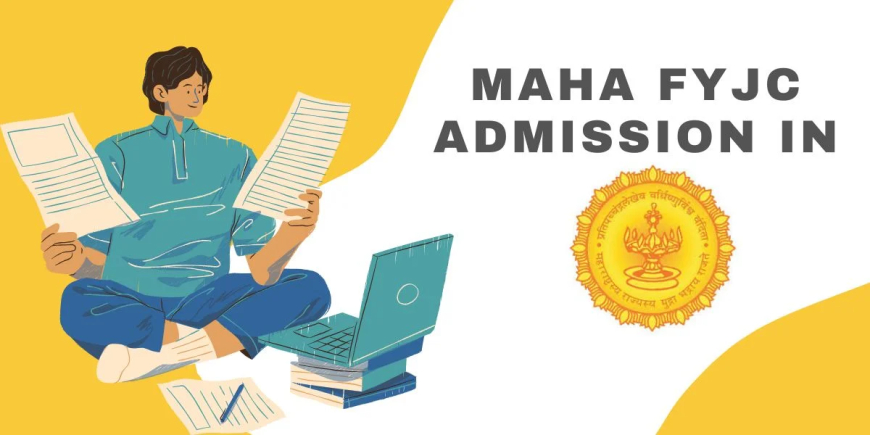Maha FYJC Admission: Complete Guide to First-Year Junior College in Maharashtra

Introduction
Education after Class 10 is a crucial transition point for every student. In Maharashtra, this transition is facilitated through the FYJC (First Year Junior College) admission process, popularly known as Maha FYJC Admission. Whether you're a parent or a student, understanding the process, deadlines, eligibility, and application system is key to securing admission in a preferred stream and college.
In this blog post, we’ll cover everything you need to know about the Maharashtra FYJC admission system, including the online procedure, eligibility criteria, important dates, and tips for applicants. We’ll also use a table to summarize key details and a list format to simplify the application steps.
Understanding Maha FYJC Admission
What Is FYJC?
FYJC (First Year Junior College) refers to Class 11 in the Maharashtra State Board of Secondary & Higher Secondary Education (MSBSHSE) system. After clearing SSC (Class 10), students must apply for admission into junior colleges offering the streams of Science, Commerce, or Arts.
The Maharashtra FYJC admission process is centralized and conducted online for major urban regions including:
-
Mumbai Metropolitan Region (MMR)
-
Pune
-
Nagpur
-
Nashik
-
Aurangabad
-
Amravati
Students from all over Maharashtra and even from other boards can apply for seats in FYJC colleges via this centralized admission portal.
Key Features of Maha FYJC Admission System
The admission process is conducted through the official website https://11thadmission.org.in, which allows for centralized registration, application, merit lists, and seat allotment.
Quick Overview of FYJC Admission System
| Feature | Description |
|---|---|
| Exam Board | Maharashtra State Board (MSBSHSE) |
| Admission For | Class 11 (First Year Junior College) |
| Streams Offered | Science, Commerce, Arts, HSVC (Vocational) |
| Admission Mode | Online (Centralized Admission Process - CAP) |
| Official Website | https://11thadmission.org.in |
| Regions Covered | Mumbai, Pune, Nashik, Nagpur, Aurangabad, Amravati |
| Basis for Admission | Class 10 (SSC/CBSE/ICSE/Other board) merit |
| Rounds of Admission | 4 Rounds (General) + Special Rounds (if required) |
Eligibility Criteria for FYJC Admission
To apply for FYJC, students must meet the following eligibility requirements:
General Criteria:
-
Must have passed Class 10 or SSC exam from Maharashtra Board or equivalent recognized board.
-
Students from CBSE, ICSE, NIOS, IB, and other boards can also apply, but they must get their marks converted as per state norms.
Region-Specific Eligibility:
-
Admission is granted based on merit, which is calculated from the SSC marks.
-
For minority and in-house quotas, students must meet respective eligibility conditions (e.g., domicile, religion, etc.).
Admission Procedure: Step-by-Step Guide
Applying for Maha FYJC admission can seem overwhelming, but it follows a logical process:
Steps to Apply for Maha FYJC Admission
-
Visit the Official Website
Go to https://11thadmission.org.in and select your region. -
Register and Verify
Sign up using a valid mobile number and email. Receive OTP for verification. -
Fill Part 1 of Application
-
Enter personal details, school information, and board information.
-
Upload necessary documents (photo, signature, mark sheet).
-
-
Wait for Merit Display
After result declaration, wait for SSC marks to be integrated. -
Fill Part 2 of Application
-
Choose preferred junior colleges and streams.
-
Arrange colleges in order of preference.
-
-
Check Merit Lists
Log in to check which college you’ve been allotted based on your merit. -
Confirm Admission
If allotted, confirm your admission within the stipulated timeline. -
Participate in Next Rounds
If not satisfied, continue participating in next rounds or special rounds.
Important Documents Required
-
SSC Mark Sheet
-
School Leaving Certificate
-
Caste Certificate (if applicable)
-
Address Proof
-
Passport-size Photograph
-
Aadhar Card
-
Minority/Quota Certificates (for specific claims)
Categories of Quotas and Reservations
Quota Breakdown for FYJC Admissions
| Quota Type | Percentage Reserved | Description |
|---|---|---|
| Minority Quota | Up to 50% | For religious or linguistic minority institutions |
| Management Quota | Up to 5% | For students selected by college management |
| In-house Quota | Up to 10% | For students of same school/chain |
| Sports/Art/Culture | Varies | For state/national level achievements |
| Social Reservation | As per Government Norms | SC, ST, OBC, SBC, VJNT |
Stream-Wise Tips for Choosing FYJC
Which Stream Should You Choose?
Choosing the right stream depends on your career goals and academic interests. Here's a general guide:
-
Science: Ideal for students aiming for Engineering, Medicine, or Pure Sciences.
-
Commerce: Suitable for careers in Accounting, Finance, Management, or Law.
-
Arts: Best for students interested in Humanities, Languages, Social Sciences, Civil Services.
-
HSVC/Vocational: Offers practical and skill-based courses for early career entry.
Frequently Asked Questions (FAQs)
Q1. Can students from other boards apply for FYJC?
Yes, CBSE, ICSE, NIOS, and other board students can apply after conversion of marks.
Q2. How many rounds are there in the admission process?
Generally, there are 4 regular rounds followed by special rounds if seats remain vacant.
Q3. Is there any application fee?
Yes, a nominal application fee (around ₹150-200) is applicable for online submission.
Q4. Can I change my college after confirming admission?
Yes, but only in the next round or through special provisions. You must not confirm admission if you want to try in future rounds.
Conclusion
The Maha FYJC Admission process is a well-structured yet competitive system that plays a vital role in shaping a student’s academic path post-SSC. With thousands of students competing for limited seats in top colleges, early preparation, accurate information, and wise stream selection are essential.
By following the steps and understanding the nuances of the online admission process, students and parents can make informed decisions and ensure a smooth transition into junior college life.
Stay updated on deadlines, prepare your documents in advance, and don’t hesitate to explore all available options before locking in your admission.





























